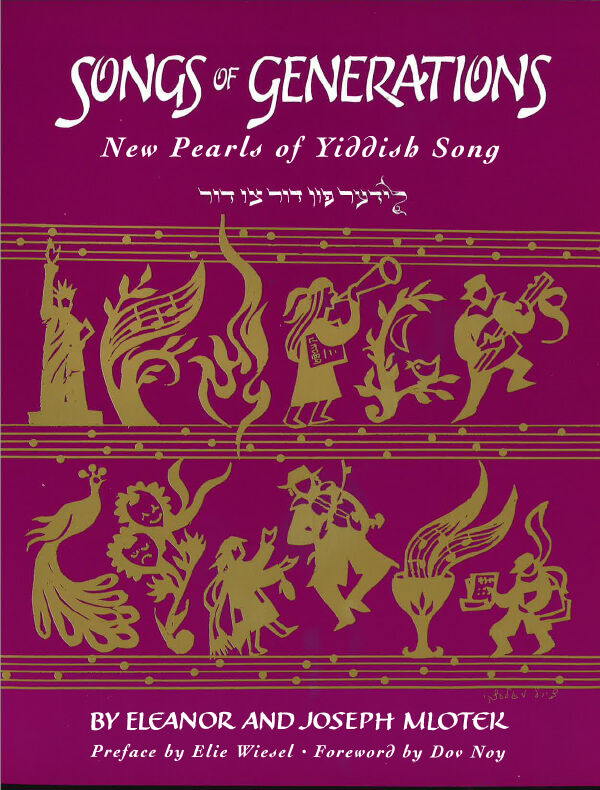The song was published in sheet music in this country in 1905, without accreditation to any author or composer, simply that it was sung by Rosa Klug. Theater historian Sholem Perlmutter writes that the song was written by the Galician Jewish composer Khone Wolfsthal (1851-1924). Although Wolfsthal never came to this country, many of his songs were adopted here and credited to others. It was sung in the musical The Golden Land by Bruce Adler.

Friday night
when I come walking from shul
my dear little wife is standing there and she laughs–
oh, she is full of charm!
And the little challahs are covered,
with a napkin that gleams.
Only a Jew knows the smell
of Friday night.
After kiddush, a piece of fish
that my wife prepared herself,
it’s worth a bit of a kiss –
on Friday night.
Oh, on Friday night
every Jew is a king.
In every corner it gleams,
the whole house is happy.
After the noodle soup
the bit of meat is also very good.
and I can feel how it tastes
because I am a Jew.
After the tsimmes, a little glass of wine –
the one who thought that up was no fool,
and I lay myself down in bed,
on Friday night.
Poor or rich–
everyone sings at the meal,
all are equal, then –
until Sunday morning.
Fraytik oyf der nakht —
Az ikh kum nor fun der shul tsu geyn,
Shteyt shoyn mayn vaybele un lakht
Oy, iz zi mole-kheyn.
Un di khalelekh tsugedekt,
Mit a servetke vos es lakht,
Nor a yidele veyst vi se shmekt
Der fraytik oyf der nakht.
Nokh dem kidesh a shtikele fish,
Vos mayn vaybele hot aleyn gemakht,
Zi iz vert in piskele a kish (kush)
Um fraytik oyf der nakht.
Refrain:
Oy, fraytik oyf der nakht
lz ayeder yid a meylekh.
In yedn vinkele lakht,
Di gantse shtub iz freylekh.
Nokh di lokshn mit yoykh
Dos shtikele fleysh iz oykh zeyer git,
Dem tam fil ikh oykh —
Vayl ikh bin a yid.
Nokh dem tsimes a glezele vayn-
Dos hot keyn nar nit oysgetrakht,
Un zikh leygn in bet arayn,
Um fraytik oyf der nakht.
Orem oder raykh —
Ayeder zingt tsum esn tsi (tsu),
Damolst iz yeder glaykh —
Biz zuntik in der fri.
פֿרײטיק אױף דער נאַכט —
אַז איך קום נאָר פֿון דער שול צו גײן,
שטײט שױן מַײַן װײַבעלע און לאַכט —
אױ, איז זי מלא-חן.
און די חלהלעך צוגעדעקט —
מיט אַ סערװעטקע װאָס עס לאַכט,
נאָר אַ ײדעלע װײסט װי סע שמעקט
דער פֿרײַטיק אױף דער נאַכט.
נאָך דעם קידוש אַ שטיקעלע פֿיש,
װאָס מײַן װײַבעלע האָט אַלײן געמאָכט,
זי איז װערט אין פּיסקעלע אַ קיש (קוש)
אום פֿרײַטיק אױף דער נאַכט.
רעפֿרײן:
אױ, פֿרײַטיק אױף דער נאַכט
איז אַיעדער ײד אַ מלך,
אין יעדן װינקעלע לאַכט,
די גאַנצע שטוב איז פֿרײלעך.
נאָך די לאָקשן מיט יױך,
דאָס שטיקעלע פֿלײש איז אױך זײער גיט (גוט),
דעם טעם פֿיל איך אױך —
װײַל איך בין אַ ייִד.
נאָך דעם צימעס אַ גלעזעלע װײַן —
דאָס האָט קײן נאַר ניט אױיסגעטראַכט,
און זיך לײגן אין בעט אַרײַן —
אים פֿרײַטיק אױף דער נאַכט.
אָרעם אָדער רײַך —
איעדער זינגט צום עסן צי (צו),
דאַמאָלסט איז יעדער גלײַך —
ביז זונטיק אין דער פֿרי.
Song Title: Fraytik Oyf Der Nakht

The Songs of Generations: New Pearls of Yiddish Song anthology comprises songs that were either never printed before or appeared in rare and inaccessible publications — sometimes in different versions and without proper sources. Most of the songs in this book were submitted by readers of Chana and Yosl’s column “Perl fun der yidisher poezye” (Pearls of Yiddish Poetry) in the Yiddish newspaper Der Forverts (The Forward), initiated in October, 1970. Over 25 years, thousands of songs were collected in correspondence and on cassettes from readers throughout the world, and they represent a veritable national Yiddish song archive. Chana Mlotek, in her introduction, writes, “In the course of years the inquiries, contributions and enthusiasm of these readers have kept our own interest unflagging and have reinforced our dedication to this effort. And in recent years our participants have also been augmented by new readers from the former Soviet Russia, who receive our newspaper there or from newly-arrived immigrants in this country and Israel.”